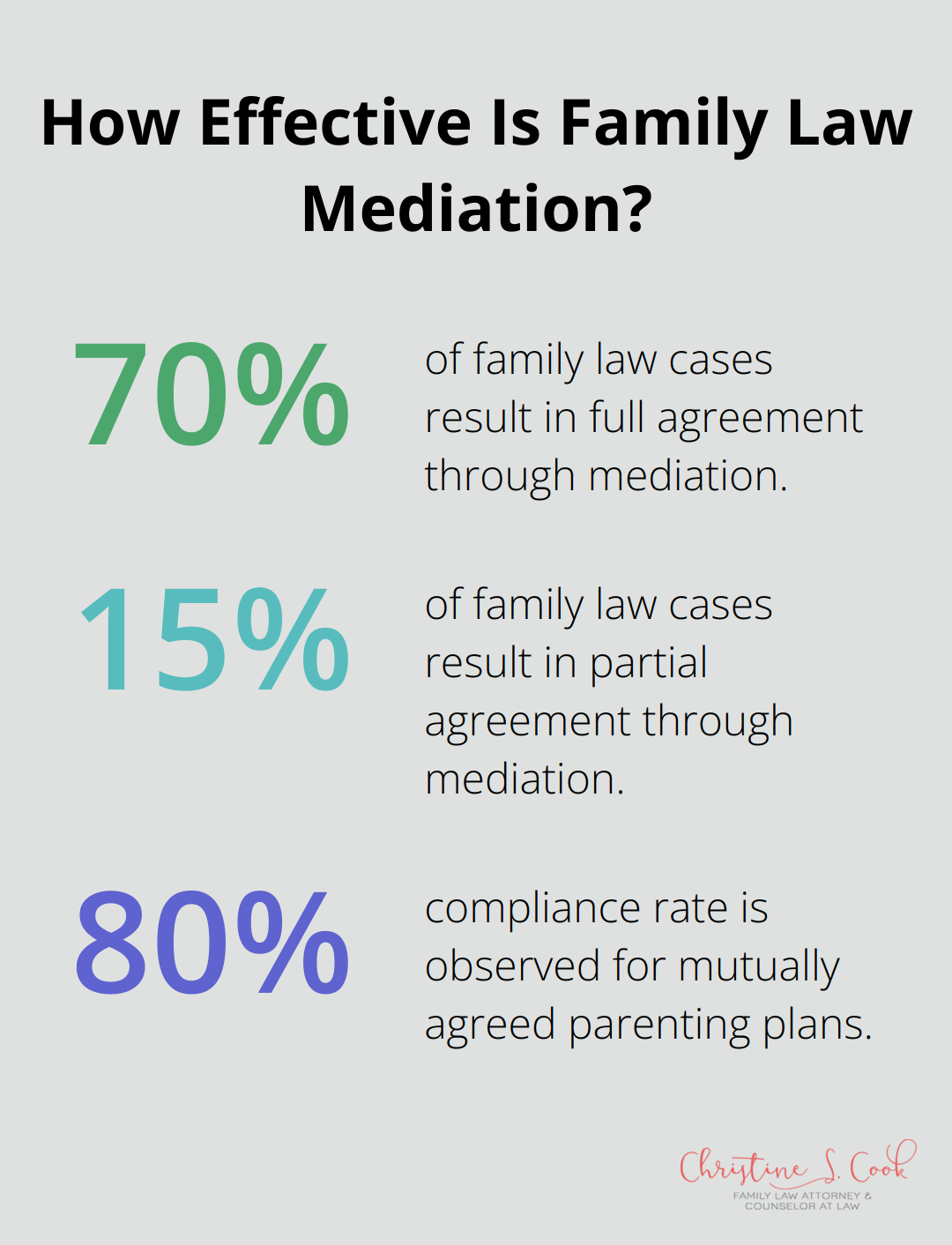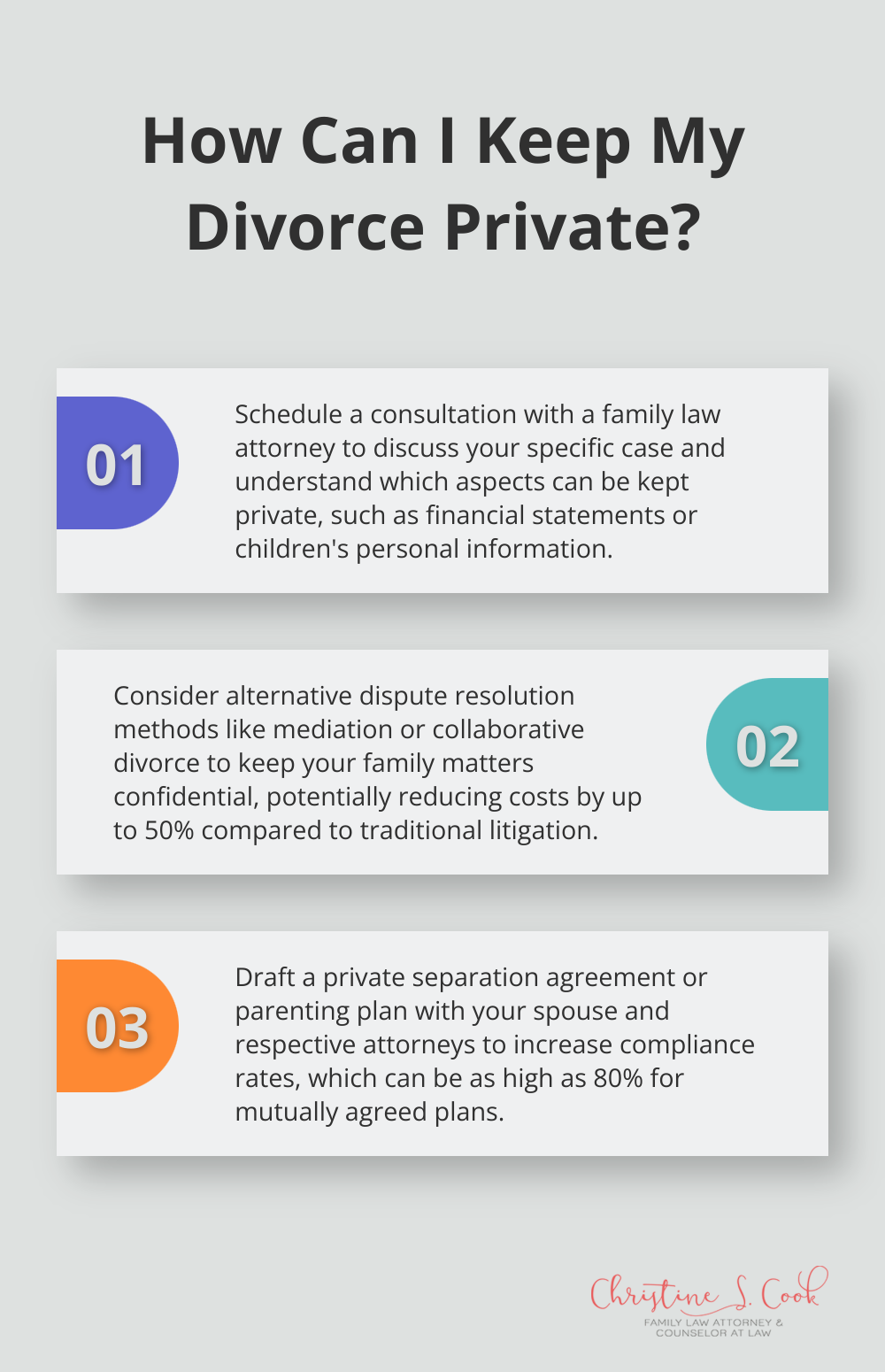Family law is a complex area of legal practice that touches the lives of many. At Christine Sue Cook, LLC, we often encounter clients wondering: Is family law public or private?
The truth is, family law straddles both realms, with aspects that are open to public scrutiny and others that remain confidential. Understanding this dual nature is key to navigating family legal matters effectively.
Family law is a body of law regulating family relationships, including marriage and divorce, the treatment of children, and related economic matters. It covers a wide range of legal matters, including divorce proceedings, child custody arrangements, adoption processes, and domestic violence cases. Financial issues such as alimony, child support, and property division also fall under its purview. In recent years, family law has expanded to include same-sex marriages and civil unions, reflecting societal changes.
The importance of family law in society cannot be overstated. It provides a framework for resolving disputes and protecting vulnerable family members, especially children. The American Bar Association reports that over 1 million children are involved in divorce proceedings each year in the United States. Family law ensures these children’s interests are protected during what can be a turbulent time.
Family law constantly adapts to meet the needs of modern families. For example, the rise of collaborative divorce has changed how many couples approach separation. The National Center for State Courts reports that collaborative divorce can reduce legal costs by up to 50% compared to traditional litigation. This approach focuses on problem-solving rather than adversarial tactics.
Family law plays a crucial role in addressing domestic violence. The National Domestic Violence Hotline reports that an average of 24 people per minute are victims of rape, physical violence or stalking by an intimate partner in the United States – more than 12 million women and men over the course of a year. Family law provides tools (such as restraining orders and emergency custody arrangements) to protect victims and their children.
Family law often intersects with other legal areas, including criminal law (in cases of domestic abuse), property law (during asset division in divorces), and contract law (for prenuptial agreements). This intersection requires family law practitioners to have a broad understanding of various legal principles and practices.

As we move forward, it’s important to understand that family law operates in both public and private spheres. The next section will explore the public aspects of family law and how they impact legal proceedings and societal norms.
Family law, while often dealing with personal matters, has significant public aspects that impact legal proceedings and societal norms. Understanding these public elements is essential for anyone navigating the family law system.
Most family law court proceedings are open to the public. This means that anyone can attend divorce hearings, custody battles, or other family-related cases. The National Center for State Courts reports that approximately 5 million family law cases are filed in state courts each year. These public proceedings maintain transparency in the legal system and allow for public scrutiny of judicial decisions.

Court records in family law cases are generally accessible to the public. However, certain sensitive information may be redacted or sealed to protect privacy. For example, financial statements or children’s personal information are often kept confidential. Many attorneys guide their clients through the process of requesting that certain documents be sealed when necessary to protect their privacy.
Family law is primarily governed by state regulations, which can vary significantly from one jurisdiction to another. For instance, Florida’s family law statutes differ from those in California or New York. These state-specific regulations cover everything from grounds for divorce to child custody guidelines.
The government plays a significant role in child welfare cases. Child Protective Services (CPS) agencies across the United States received an estimated 4.4 million referrals (involving approximately 7.9 million children) in 2019, according to the U.S. Department of Health & Human Services. These agencies investigate allegations of child abuse or neglect and can initiate court proceedings to protect children’s welfare.
Family law decisions often reflect broader public policy considerations. For example, the shift towards favoring joint custody arrangements in many states is based on research showing better outcomes for children when both parents are involved in their lives. The National Parents Organization reports that shared parenting is the norm in only 25 states, highlighting the ongoing evolution of family law policies.
Another example of public policy influence is the implementation of child support guidelines. These guidelines, which vary by state, try to ensure consistent and fair support orders. The Office of Child Support Enforcement reports that $32.4 billion in child support was collected in the fiscal year 2019, demonstrating the significant public interest in enforcing these obligations.
The public nature of family law serves to maintain transparency and accountability within the legal system. Open court proceedings allow for public scrutiny of judicial decisions, ensuring that judges adhere to legal standards and make fair rulings. This transparency also helps to build public trust in the family law system and provides valuable insights for legal professionals and policymakers.
While family law has many public aspects, it also includes private elements that protect the sensitive nature of family matters. The next section will explore these private elements and how they balance with the public aspects of family law.
Family law cases often involve sensitive personal information, and protecting privacy is a key aspect of legal proceedings. While many aspects of family law are public, significant private elements safeguard individuals and families during challenging times.

Confidentiality is a cornerstone of family law practice. Attorneys must follow strict ethical rules to maintain client confidentiality. The American Bar Association’s Model Rules of Professional Conduct require lawyers not to reveal information relating to client representation unless the client provides informed consent. This confidentiality covers all communications between the attorney and client, allowing individuals to speak freely about their case without fear of disclosure.
In family law cases, courts may seal or redact certain documents to protect sensitive information. Financial statements, medical records, and details about minor children often remain confidential.
Mediation and collaborative divorce processes offer private alternatives to public court proceedings. These methods allow parties to resolve disputes confidentially, outside the courtroom. A study by the American Bar Association found that mediation results in full agreement in 70% of cases, with partial agreement in another 15%. These private resolution methods not only protect privacy but also tend to be less adversarial and more cost-effective.
Many family law matters find resolution through private agreements between parties. Prenuptial and postnuptial agreements allow couples to set their own terms for property division and spousal support in the event of a divorce. These agreements remain private unless they need enforcement in court.
Separation agreements and parenting plans can also undergo private negotiation with the help of attorneys. The National Parents Organization reports that privately negotiated parenting plans tend to have higher compliance rates than court-imposed orders (with some studies showing up to 80% compliance for mutually agreed plans).
Family law places a high priority on protecting the identities and interests of minors. In cases involving children, courts often use initials instead of full names in public documents. The U.S. Department of Justice guidelines recommend that juvenile records remain confidential to protect children’s privacy and future opportunities.
Family law occupies a unique position in the legal landscape. It balances public and private elements to serve both societal and individual needs. The question “Is family law public or private?” requires a nuanced understanding of how these aspects intertwine and complement each other.

Public elements of family law promote transparency and accountability. They shape decisions based on broader societal values and protect vulnerable individuals. Private aspects safeguard sensitive information and allow families to resolve issues away from public scrutiny. This dual nature enables the system to evolve and serve the best interests of families and society.
At Christine S. Cook, LLC, we understand the importance of navigating both public and private aspects of family law. We combine our expertise in family law and estate planning to offer comprehensive solutions. Our approach respects individual privacy while leveraging public legal processes to achieve the best outcomes for our clients.
